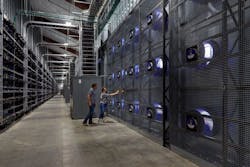Tenaska Constructing Carbon Capture and Storage Hub in Alabama to Decarbonize Industrial and Manufacturing Sectors
Tenaska, a private US energy company, has announced its plans to construct the Longleaf CCS Hub - a carbon capture and storage (CCS) project planned for Mobile County, Alabama.
The CCS Hub's first priority will be to provide a solution to assist manufacturers, power plants, industrial processors, and other industries in South Alabama in meeting emissions regulations and climate mandates.
Additionally, the hub will add to the region's stability and growth by offering a path for existing businesses to comply with evolving environmental standards and attract new ventures that contribute to the region's economic and employment opportunities.
"We are delighted to see the unveiling of Tenaska's Longleaf CCS Hub, which will employ cutting-edge technology to securely store carbon dioxide emissions from industrial processes and keep them out of the atmosphere," said Mobile Chamber President and CEO Bradley Byrne. "This project is a significant step toward a sustainable future for South Alabama that not only addresses the pressing need for efficient CO2 management solutions but also promises to bolster our region's economic resilience and employment stability."
The Longleaf CCS Hub has received $17.9 million in funding from the US Department of Energy's Office of Fossil Energy and Carbon Management to support geological characterization and permitting efforts.
The DOE funding also brought together a diverse project team to support the Hub's construction, including the Southern States Energy Board, Advanced Resources International, Crescent Resource Innovation, the University of Southern Alabama, and Williams.
Related Story from Offshore Magazine
NSTA issues North Sea Carbon/Injection Storage Guidance
Baker Hughes Oil Field Services and Environmental Resources Management will also participate as vendors, and Southern Company Services will act as the Project Industry Network lead.
"Our organization is dedicated to eliminating barriers preventing technological innovation while maintaining a firm commitment to improving the nation's energy and environmental standards," said Ken Nemeth, Secretary of the Southern States Energy Board. "This project is one more step on the path toward sustainable energy security in the South."
Tenaska's initial development of the CCS Hub began in 2022, and the project's Class VI application is currently under review by the US Environmental Projection Agency. Tenaska is also actively soliciting interest from a number of emitter customers in the region.
Pending all necessary permitting approvals, construction is slated to begin in late 2025, and commercial injection is expected within a year of project completion.
About the Author
EnergyTech Staff
Rod Walton is head of content for EnergyTech.com. He has spent 17 years covering the energy industry as a newspaper and trade journalist.
Walton formerly was energy writer and business editor at the Tulsa World. Later, he spent six years covering the electricity power sector for Pennwell and Clarion Events. He joined Endeavor and EnergyTech in November 2021.
He can be reached at [email protected].
EnergyTech is focused on the mission critical and large-scale energy users and their sustainability and resiliency goals. These include the commercial and industrial sectors, as well as the military, universities, data centers and microgrids.
Many large-scale energy users such as Fortune 500 companies, and mission-critical users such as military bases, universities, healthcare facilities, public safety and data centers, shifting their energy priorities to reach net-zero carbon goals within the coming decades. These include plans for renewable energy power purchase agreements, but also on-site resiliency projects such as microgrids, combined heat and power, rooftop solar, energy storage, digitalization and building efficiency upgrades.
